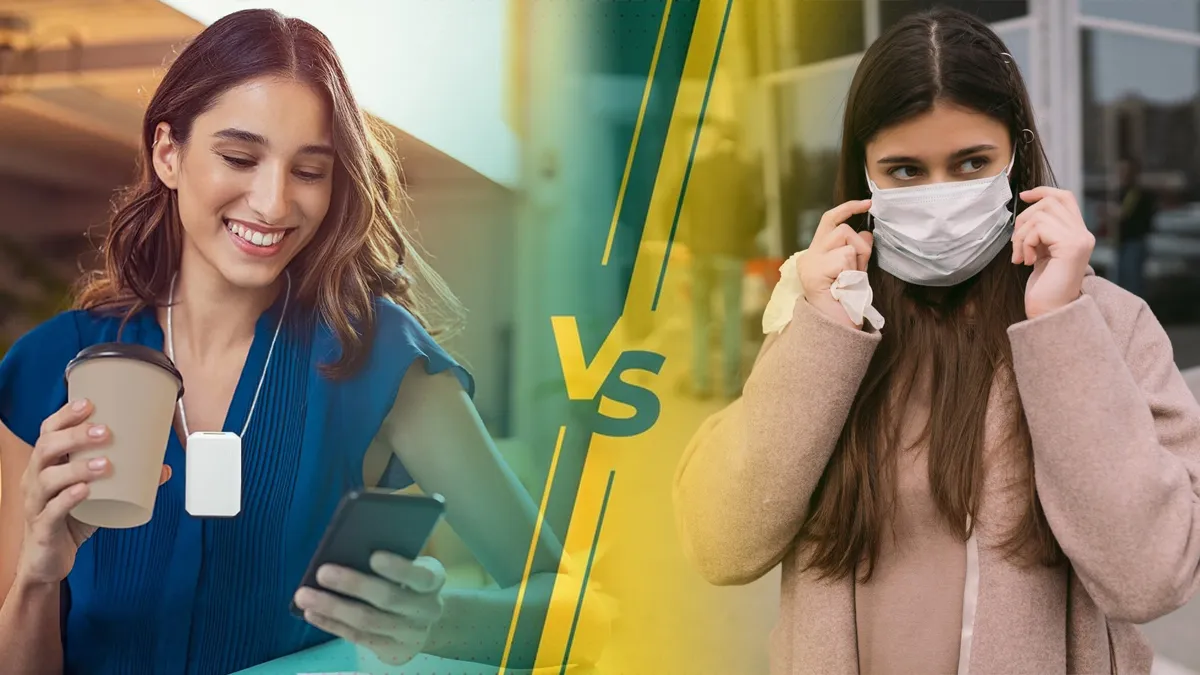
The air quality of Delhi has been deteriorating with each passing day. Its Air Quality Index (AQI) has now breached the 400 mark – falling under ‘hazardous levels’. The Commission for Air Quality Management (CAQM) has implemented Graded Response Action Plan (GRAP-III), to take the situation under control.
Table of Content:-
On an individual level, every person is trying their best to protect themselves from the wrath of air pollution. One of the basic and simplest among all the ways is wearing a mask. Many are using air purifiers at homes or workplaces to keep themselves safe. What if we tell you that you can now carry an air purifier wherever you go? Yes, you read that right. These are tiny portable air purifiers, which you can wear around your neck as a neckpiece. So are these wearable air purifiers better than masks? Or are masks the best option? Let’s find out.
To get an expert view on this, we reached out to Dr Ravi Shekhar Jha, Director and Unit Head, Pulmonology, Fortis Escorts Hospital, Faridabad.
How Helpful Are Masks Against Air Pollution?
Masks were our saviours during Covid-19 pandemic. They are still protecting us from a number of air-borne diseases, and now, even from pollution. “Masks remain the most practical and scientifically proven method to reduce exposure to harmful airborne pollutants. A well-fitted N95 or FFP2 mask can filter out up to 95% of particulate matter (PM2.5 and PM10), which are the most dangerous components of polluted air,” shares Dr Jha.
Now, if you are wondering which mask is the best for this purpose, our expert answers this for you as well. “For people living in highly polluted cities, N95 masks offer good day-to-day protection when worn properly, covering both nose and mouth without air gaps. Cloth or surgical masks do not provide the same level of filtration and are not effective against fine particulate matter,” he adds.
Disadvantages Of Masks
On this note, Dr Jha shares some of the cons of using masks to safeguard against air pollution:
- Wearing a mask for long hours can cause discomfort, skin irritation, and sometimes breathing resistance, especially in people with pre-existing respiratory diseases.
- They can also trap heat and humidity, making prolonged outdoor use less tolerable.
- Another issue is improper fit — even a small leak around the nose or cheeks can significantly reduce effectiveness.
Also Read: Amid Delhi’s High AQI, Can N95 Masks Save You from Pollution? We Asked an Expert
How Helpful Are Wearable Air Purifiers Against Pollution?
Dr Jha notes that wearable air purifiers are a newer concept. “These devices work by creating a localised clean-air zone around the face using ionization or micro-filtration technology. While some small studies show a modest reduction in nearby particulate levels, their real-world benefit is still limited. They cannot offer the same sealed filtration as a mask, especially in high-pollution environments or during heavy outdoor activity.”
The expert also jots down some points that one should keep in mind while buying wearable air purifiers:
- Look for scientifically validated performance data — not just marketing claims.
- Check for certification of PM2.5 or PM10 reduction, battery life, and noise level.
- Comfort, portability, and after-sales support also matter.
- Avoid products without transparent test results or those relying only on ionization without proper filtration.
Disadvantages Of Wearable Air Purifiers
Wearable air purifiers come with its own set of cons. Dr Jha lists them down for us:
- Their coverage is small and effectiveness can vary with wind, movement, and outdoor conditions.
- Some ionizer-based devices can generate small amounts of ozone, which is itself a lung irritant.
- They also require charging and regular maintenance, which reduces practicality for daily use.
Mask Vs Wearable Air Purifier — Which One Is Better?
Now, we know the pros and cons of both masks and air purifiers. It’s time to address the elephant in the room – which one is more effective?
“At present, masks are clearly more effective and reliable for protection against air pollution. N95 and FFP2 masks have well-documented filtration standards and provide consistent, immediate protection when worn properly. Wearable air purifiers may have a supportive role in low-exposure environments or indoors, but they cannot replace the physical barrier provided by a good mask,” concludes Dr Jha.
The Final Word
Wearable air purifiers are not used as much as masks. The latter is a better option because masks are more effective, reliable for protection against air pollution and can be used easily without much effort.
Also watch this video
FAQ
Are wearable air purifiers effective?
Wearable air purifiers have limited effectiveness. Some studies show they can help with larger particles and allergens, but they are generally less effective when it comes to gases and very fine particles, as compared to properly fitted masks.What are the side effects of wearable air purifiers?
Ozone-producing or ionizing purifiers can irritate the lungs, worsen asthma or allergies, and should be avoided.How do I choose a wearable air purifier?
While choosing a wearable air purifier, check if it uses a HEPA filter.Do wearable air purifiers emit ozone?
Wearable air purifiers release a small amount of ozone directly into the user's breathing area. This can greatly increase the level of ozone exposure of the human body.
How we keep this article up to date:
We work with experts and keep a close eye on the latest in health and wellness. Whenever there is a new research or helpful information, we update our articles with accurate and useful advice.
Current Version
Nov 12, 2025 15:32 IST
Modified By : Shruti DasNov 12, 2025 15:32 IST
Published By : Shruti Das
